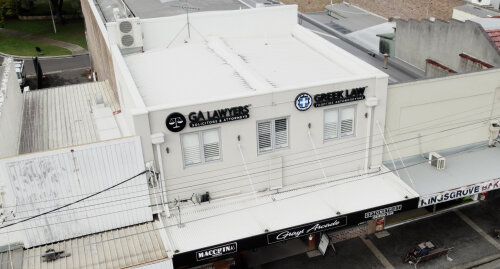Best Employment & Labor Lawyers in Sydney
Share your needs with us, get contacted by law firms.
Free. Takes 2 min.
List of the best lawyers in Sydney, Australia
Australia Employment & Labor Legal Articles
Browse our 1 legal article about Employment & Labor in Australia written by expert lawyers.
- Fired Without Warning in Australia: Unfair Dismissal Guide
- Most Australian workplaces are covered by the Fair Work Act 2009 (Cth), National Employment Standards (NES) and a modern award or enterprise agreement that set minimum pay and conditions. Strict deadlines apply: unfair dismissal and most general protections dismissal claims must be lodged with the Fair Work Commission within 21... Read more →
About Employment & Labor Law in Sydney, Australia
Employment and labor law in Sydney, Australia is designed to govern the relationship between employers and employees, ensuring fair treatment and adherence to established standards. This legal field covers various aspects such as employment contracts, workplace rights, discrimination, termination, and other workplace-related issues. Sydney, being a vibrant economic hub, is subject to both federal and state legislation, offering a detailed legal framework to protect both employers and employees.
Why You May Need a Lawyer
There are several situations where individuals or businesses might require legal assistance in the realm of employment and labor law. These can include:
- Disputes over employment contracts or terms of employment.
- Unfair dismissal or redundancy issues.
- Workplace discrimination, harassment, or bullying claims.
- Issues concerning wages, overtime, and employee benefits.
- Questions about workers' compensation claims.
- Negotiations during collective bargaining or industrial relations disputes.
- Navigating complex employment regulations and compliance requirements.
Local Laws Overview
The employment and labor law landscape in Sydney is shaped by both Commonwealth laws and New South Wales state laws. Key areas include:
- Fair Work Act 2009: This federal law establishes minimum employment standards across the country, including Sydney. It covers areas such as minimum wage, leave entitlements, and the process for resolving disputes.
- NSW Anti-Discrimination Act 1977: This state legislation prohibits discrimination in the workplace based on attributes such as race, gender, and disability.
- Work Health and Safety Act 2011 (NSW): This establishes the duties of employers to ensure a safe working environment for all workers.
- Long Service Leave Act 1955 (NSW): Provides entitlements related to long service leave for employees in New South Wales.
Frequently Asked Questions
What rights do I have under Australian employment law?
Employees have numerous rights, including the right to fair pay, safe working conditions, protection from unfair dismissal, and freedom from discrimination and harassment in the workplace.
How can I tell if I'm being paid correctly?
Your pay must meet at least the national minimum wage or the award rate specific to your industry. It's essential to review your pay slips and employment contract and consult with the Fair Work Ombudsman if in doubt.
What should I do if I experience discrimination at work?
Document the incidents and report it to your HR manager or employer. If unresolved, you can lodge a complaint with the Anti-Discrimination Board of New South Wales.
Can my employer change my work hours or role without my consent?
Any changes should be consistent with your employment contract. Significant changes typically require consultation and, in some cases, mutual agreement.
What constitutes unfair dismissal?
Unfair dismissal occurs when an employee is dismissed in a harsh, unjust, or unreasonable manner. This includes being terminated without a valid reason.
How can I resolve a workplace conflict?
Start by discussing the issue directly with those involved. If unresolved, consider mediation or assistance from a legal professional specialising in employment law.
What is workplace bullying, and how is it addressed legally?
Bullying is repeated unreasonable behavior that creates a risk to health and safety. It can be addressed through workplace policies, and victims can seek recourse via the Fair Work Commission.
What are my leave entitlements as an employee in Sydney?
Employees are entitled to various types of leave, including annual leave, personal leave, parental leave, and long service leave, subject to specific conditions under relevant laws.
How are disputes handled if I'm part of a union?
Union members can seek support from their union representatives, who often assist in negotiations, mediation, and representing members' interests in disputes.
What steps should I take if I suffer a workplace injury?
Report the injury to your supervisor immediately and seek medical attention. You may be eligible for workers' compensation under the local legislations.
Additional Resources
There are several resources and organizations that can assist you with employment and labor law matters:
- Fair Work Ombudsman: Provides information and advice about workplace rights and obligations.
- NSW Industrial Relations: Offers guidance on state-specific employment laws and issues.
- Anti-Discrimination Board of NSW: Helps address issues related to discrimination in the workplace.
- SafeWork NSW: A resource for workplace health and safety regulations.
- Legal Aid NSW: Provides legal assistance and support to individuals facing employment disputes.
Next Steps
If you need legal assistance in employment and labor matters, consider the following steps:
- Document the Issue: Keep detailed records of any incidents or disputes, including dates, times, and any communications.
- Research Your Rights: Familiarize yourself with relevant laws and rights to better understand your situation.
- Consult with a Legal Professional: Seek advice from an employment lawyer who can provide guidance and represent your interests effectively.
- Contact Relevant Authorities: If necessary, contact bodies like the Fair Work Ombudsman for further guidance and support.
With the right information and support, navigating employment and labor law in Sydney can be manageable and effective in resolving disputes or ensuring your rights are protected.
Lawzana helps you find the best lawyers and law firms in Sydney through a curated and pre-screened list of qualified legal professionals. Our platform offers rankings and detailed profiles of attorneys and law firms, allowing you to compare based on practice areas, including Employment & Labor, experience, and client feedback.
Each profile includes a description of the firm's areas of practice, client reviews, team members and partners, year of establishment, spoken languages, office locations, contact information, social media presence, and any published articles or resources. Most firms on our platform speak English and are experienced in both local and international legal matters.
Get a quote from top-rated law firms in Sydney, Australia — quickly, securely, and without unnecessary hassle.
Disclaimer:
The information provided on this page is for general informational purposes only and does not constitute legal advice. While we strive to ensure the accuracy and relevance of the content, legal information may change over time, and interpretations of the law can vary. You should always consult with a qualified legal professional for advice specific to your situation.
We disclaim all liability for actions taken or not taken based on the content of this page. If you believe any information is incorrect or outdated, please contact us, and we will review and update it where appropriate.
Browse employment & labor law firms by service in Sydney, Australia
Sydney, Australia Attorneys in related practice areas.

















